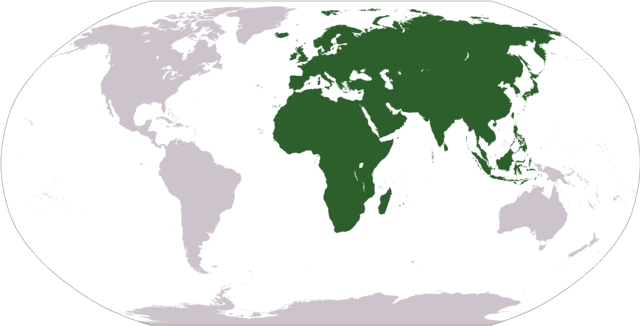Top Qs
Timeline
Chat
Perspective
Old World
Synonym of Afro-Eurasia From Wikipedia, the free encyclopedia
Remove ads
The "Old World" (Latin: Mundus vetus) is a term for Afro-Eurasia coined by Europeans after 1493, when they became aware of the existence of the Americas.[1] It is used to contrast the continents of Africa, Europe, and Asia in the Eastern Hemisphere, previously thought of by the Europeans as comprising the entire world, with the "New World", a term for the newly encountered lands of the Western Hemisphere, particularly the Americas.[2]
This article needs additional citations for verification. (March 2013) |

Old World


Remove ads
History
In the context of archaeology and world history, the term "Old World" includes those parts of the world which were in (indirect) cultural contact from the Bronze Age onwards, resulting in the parallel development of the early civilizations, mostly in the temperate zone between roughly the 45th and 25th parallels north, in the area of the Mediterranean, including North Africa. It also included Mesopotamia, the Persian plateau, the Indian subcontinent, China, and parts of Sub-Saharan Africa.[citation needed]
These regions were connected via the Silk Road trade route, and they had a pronounced Iron Age period following the Bronze Age. In cultural terms, the Iron Age was accompanied by the so-called Axial Age, referring to cultural, philosophical and religious developments eventually leading to the emergence of the historical Western (Hellenism, "classical"), Near Eastern (Zoroastrian and Abrahamic) and Far Eastern (Hinduism, Buddhism, Jainism, Sikhism, Confucianism, Taoism) cultural spheres.
Remove ads
Other names
The mainland of Afro-Eurasia (excluding islands or island groups such as the British Isles, Japan, Sri Lanka, Madagascar and the Malay Archipelago) has been referred to as the World Island. The term may have been coined by Sir Halford John Mackinder in The Geographical Pivot of History.[3]
References
Wikiwand - on
Seamless Wikipedia browsing. On steroids.
Remove ads
